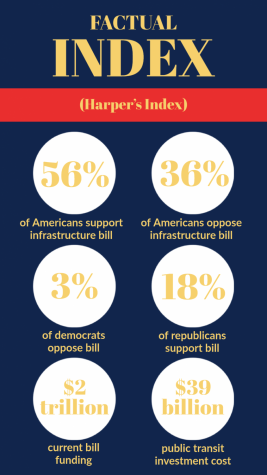What’s Biden up to?

“This is what we were elected to do, and we will get it done,” President Biden posted on social media about the Build Back Better Agenda and his Bipartisan Infrastructure deal, his main priorities as his presidency continues.
Biden visited Howell, Michigan on Oct. 5 to continue building public support for the massive one trillion dollar bipartisan infrastructure bill, which is receiving some opposition from republicans, as well as members of the democratic party. During his visit, he said the plan would help the nation take back the momentum it used to have.
Senior Milo Zelle said, “I think a central question to any government spending is, ‘is this money being used for the right thing?’ I think largely the policies in his plan are, for the most part, very good uses of the money.”
The infrastructure bill would fund rebuilding and repairing roads and bridges, highways, airports, and broadband networks. The deal also includes a 39 billion dollar investment in public transit, the largest federal investment in public transit in history. It will modernize older buses and rail fleets, make stations accessible to all, and bring transit services to new communities.
Freshman Alba Markowitz Mulet rides St. Paul public buses to school every day. “A problem I’ve recently experienced is that when you are riding the bus, and you have to get off to take another bus, I miss the second because the tracks cross each other,” she said. “The first bus I am on has to wait for the second to pass, making me late. To me, the priority in the infrastructure bill, with buses specifically, is to pay the drivers more. Unless the investment is used to pay the bus drivers better, I think modernizing buses is unnecessary.”
I think a central question to any government spending is, ‘is this money being used for the right thing?’ I think largely the policies in [Biden’s] plan are, for the most part, very good uses of the money.
— Milo Zelle
The infrastructure bill wouldn’t need republican support because it would go through reconciliation; a parliamentary procedure of Congress meant to expedite the passing of some budgetary legislation in the senate. “Stop The Spending” protesters rallied with Michigan Republican Party’s Co-Chair Meshawn Maddock on Oct. 5, holding signs such as “Stop selling us out,” and “Trump won.”
“We spend pretty tremendous amounts of money every year, and this is the sort of deficit hawkary and going after government spending you always see when progressive policies are being pushed,” Zelle said. “This would be a significant increase in the expenditures of the state, but we just left a war which cost us trillions upon trillions of dollars over 20 years. Those aren’t questions we ask when we go to war.” Brown University’s Costs of War Project estimated the spending for The Afghanistan War was roughly 2.26 trillion dollars. The infrastructure bill will cost two trillion dollars.
The Build Back Better Agenda and the Bipartisan Infrastructure Deal will change our country drastically. If both are passed; jobs will hopefully be created, infrastructure in America will improve greatly, costs for working citizens and families will be lowered, and taxes will be cut. Biden told his 14.2 million Twitter followers, “These bills are about competitiveness versus complacency. Opportunity versus decay. They’re about leading the world — or continuing to let the world pass us by.”
My name is Eliana Mann (she/her). I work as the Production Manager for The Rubicon online, and this is my fourth year on staff. At school, I’m a captain...